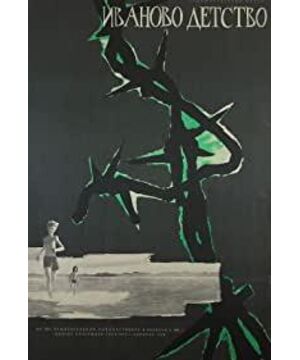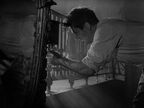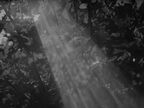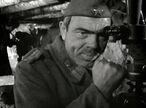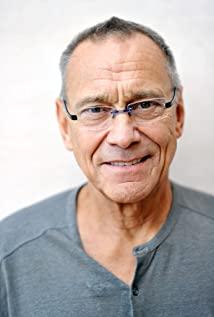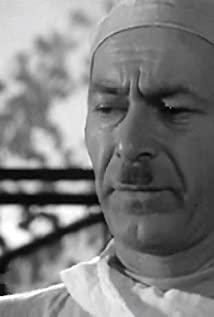A brief analysis of the film
(1) War and childhood
The little scout Ivan has a unique way of recording information. The various fruits dropped in the woods represent the various equipment of the enemy. He will grab a handful of fruits and put them in his pocket, and then sneak back into the army. The Germans caught it, and they wouldn't understand what information Ivan had collected. Little Ivan's reconnaissance work has been done very well. He is small, agile, and more importantly, he has a firm will that surpasses his peers. His determination to kill the enemy is extremely strong. If Colonel Herring orders him to return. When going to the military school in the rear, he will protest desperately, "I will escape from the military school, just like I escaped from the children's home." Ivan was an orphan, his mother and sister died under the fire of the Nazis, his father died on the battlefield, and he only depended on the officers in the army. The only purpose of his life may be to defeat the Nazis. In his broken heart, only Get revenge.
The massacre left Ivan alone and isolated. Even in the face of the officers who protected and loved him, he harbored distrust, and in a dialogue between Ivan and the lieutenant, the latter persuaded Ivan to leave the battlefield. It's not a suitable place for him, but Ivan responded viciously: "Those who don't go to the battlefield in the war are trash, have you been to a death camp? You have no qualifications to teach me, you all have ulterior motives for me! "The lieutenant was speechless, the little monster in front of him couldn't find his way to love.
But Ivan is longing for love, but the war has deprived him of the ability to feel love in the real world. He often fell into dreams, and when darkness enveloped the earth, when his strength was gradually diminished by the night, Ivan returned to the state of being a child. He would dream of the days with his mother, the time of playing with his sister, these beautiful dreams. He would always be smashed by shells, and Ivan would wake up screaming. Ivan who woke up was a mature adult again. He asked the lieutenant beside him, "Did I just talk in my sleep? I didn't talk in my sleep before. But maybe now.” The torment brought by the war made him hallucinate all the time. For him, the nightmares in the waking state were no different from the nightmares in the night. When he was alone in the room to simulate reconnaissance, his eyes The words engraved on the wall after he was captured would emerge, and he would hear the voices of the enemy, the cries of his compatriots, and finally even the cheers of the people in the square after the victory. At this time, he excitedly rang the bell and shouted at the wall " Ulla", and the next moment he began to judge the captured enemies, he wanted to punish them severely, but he couldn't utter a harsh word in full, he couldn't help himself, curled up and cried.
This is Ivan, a mad little hero, a poor innocent victim of war, a child surrounded by fear and choosing to escape fear in battle. He has been internalized and forged by violence, and it is inevitable that he will die under the guillotine of the enemy. The best ending, the time of peace has no place for Ivan, the French philosopher Sartre's comment made this point most vividly, "Even if it survives, the war kills those who made it ... every movement. history needs these heroes, it creates them, and it destroys them by causing them to suffer in the society it has shaped.” One should confront the image of the hero of war, whose essence is full of murderous madness, and whose The brilliance represented above behavior is the most deliberate ridicule and distortion of human nature by war.
(2) Brotherhood in war
In addition to the concern for the protagonist Ivan, there is another theme in the film, which is presented through the relationship between the colonel, the lieutenant and Ivan. The colonel is a veteran with combat experience. Although he is short-tempered, he is stable, mature, delicate and gentle in his actions. He is a typical image of a father in the army. The lieutenant is a young man, restrained and brave, more like Ivan's brother. In the film, director Tarkovsky implied the unity of the three through various lens languages, such as the overlap of shadows, the overlap of scars on the face, the scheduling of actors' movements, etc. In terms of the plot, the three supported each other, Fighting together brings a touch of warmth to the cold and cruel war years.
In Tarkovsky's book "Sculpting Time", "Ivan's Childhood" tells the story of the people's yearning for brotherhood in the barbaric era of foreign invasion and incarceration. , that is, the ideals of brotherhood, love, and divine tranquility, gave birth to the genius "Holy Trinity", so towards the end of the film, the images of Ivan, the lieutenant and the colonel overlap more and more, as if this is a person's childhood, youth and The three stages of adulthood, Tarkovsky wants people to believe that in difficult times, love and peace, unity and brotherhood can also exist, while war distorts human nature, some more noble spirit of humanism Not only will it not be defeated, but it will shine even more profoundly.
2. The Pain of the Soviet Union - The Great Patriotic War
The image of Ivan is only one of the reflections of the countless suffering people in the Soviet-German war. What happened to the Soviet Union in that war?
As an important part of the World Anti-Fascist War, the Soviet-German War was called the "Great Patriotic War" (Russian: Великая Отечественная Война), which occurred between the Soviet Union and Nazi Germany and their allies during World War II. The war began with Germany's attack on the Soviet Union on June 22, 1941, and ended with Germany's unconditional surrender to the Soviet Union on May 9, 1945.
According to Western statistics, in the Soviet-German war, the total number of Soviet troops killed was more than 10.6 million, and civilian deaths were more than 17.4 million. In the face of such a heavy number, the Soviet-German war became the largest, most intense, and most violent war in World War II. The battlefield with the heaviest casualties is also known as the most tragic and deadly war of the twentieth century.
As the attacked party, the civilian population of the Soviet Union was the most vulnerable and innocent, and the losses were also extremely heavy. After the German invasion of the Soviet Union, they carried out a callous "rational slaughter" of the Soviet people, that is, an organized and systematic policy of genocide, killing or overworking the Soviets in concentration camps, just as they treated the Jews; In addition, there were also many Soviet people who died of bombing, injuries, and starvation. The most typical example was the brutal defense of Leningrad. Three million Leningrad soldiers and civilians were urgently mobilized to participate in the battle, and the death toll was as high as More than 640,000 people. For Hitler, he "needed neither a hostile Russia nor a friendly Russia", he "only needed a land in the East". The inhabitants of the Soviet Union lost 7.4 million in the areas occupied by Germany, including 1.8 million in the Russian Federation, 3.256 million in Ukraine, 1.547 million in Belarus, 370,000 in Lithuania, 314,000 in Latvia, 61,000 in Estonia and 6.4 in Moldavia 10,000 people, about 8,000 people in Karelia. [1]
After the war, the fate of a generation was completely destroyed. If one were to search for the birth dates of Soviet leaders, one would find bleakly that there were no leaders born in the 1920s, which is what the Soviet Union called "old man politics."
In addition to reporting some cold numbers, it is really difficult to describe this war in words, but in the process of writing, it will become more and more into Ivan's mood. In this film poetized by Tarkovsky, we will see fireballs across the sky, clear and bright water, and vast birch forests. What we feel is the endless sadness and despair behind the scenery, and For Ivan, these are all forgotten childhoods. He does not exist in such a beautiful nature. What burns in him is the flame of vengeance. If he cannot eliminate the war, then the war will definitely eliminate him.
3. Looking at the Soviet Union during the Thawing Period through the New Wave of Soviet Films
The creation time of "Ivan's Childhood" was not immediately after the Soviet-German war, and experienced a twists and turns of literary reforms mixed with political factors.
After World War II, the world generally fell into a post-war slump. The Stalin government believed that people needed reconstruction. In a series of criticisms carried out by the Party Central Committee from 1946 to 1948, the field of literary creation was pushed to the "non-conflict theory" and "whitewashing reality" However, the result led to the "frozen" state of Soviet literature. Under the requirements of "socialist realism", two types of works have appeared, one is the propaganda and worship of Stalin, and the other is the praise of life regardless of the facts. Typical representatives in the field of film are "The Conquering of Berlin" and "Stalinger" "The Great Bloody Battle", "Venus Hero", "Happy Life" and so on.
It was not until the death of Stalin in 1953 that Soviet literature began to enter a new period of development. Writers first felt the change in climate. In May 1954, the famous Soviet Jewish writer and journalist Ilya Ehrenburg published a novella titled "Thaw", trying to explain what happened in Soviet society for a period of time after Stalin's death. Various changes, and later, people regarded the recovery and changes of Soviet literature from Stalin to the 1960s as the "thawing" of literature, and this period was also regarded as a sign of an era. The main feature of Thawed Literature is that it strongly expresses human individuality and dignity, demands freedom from political interference, and allows creators to truly and freely speak for the people. Gori Chukhrai's "Forty-first" is widely regarded as the first masterpiece of Soviet New Wave cinema. After that, a large number of outstanding filmmakers emerged, and "Ivan's Childhood" was born at this time. It was accompanied by "Yan Nanfei", "A Man's Encounter" and "Song of the Soldier" in the same period. At the peak of the new wave of Soviet cinema, both the subject matter and the creative methods were greatly diversified. Once "people" rather than "heroes" were placed at the center, the truth of war and society could be revealed.
In fact, the thaw period was not a liberal trend of thought guided by Khrushchev. On the contrary, Khrushchev regarded thaw literature as a flood [2] , and adopted repressive attitudes and methods, while the real initiator of thaw literature was It was the group of brave writers who spontaneously criticized the literary policy of Stalin's period and opposed the political oppression of literature by using their own words, speeches at conferences, and letters to leaders. They were not afraid of threats and persisted in struggle. The thawing of literature should be a continuous struggle between control and anti-control [3] .
Fortunately, the Soviet Union once set off such a wave of culture, leaving behind wonderful spiritual treasures. Classic images such as Veronica, Alyosha, Sokhorov, and Ivan have been able to cross the long history and bring peace to people living in peace. In the past, we have brought endless reflection and inspiration.
[1] Wu Wei. The Problem of Personnel Loss During the Great Patriotic War of the Soviet Union [J]. History Teaching (University Edition), 2015, (10):3-11.
[2] Khrushchev: "The Last Words", Oriental Publishing House, 1988, p. 38
[3] Shen Zhihua: "The Rise and Collapse of Great Powers", Social Science Literature Publishing House, 2009, p. 944
View more about Ivan's Childhood reviews


